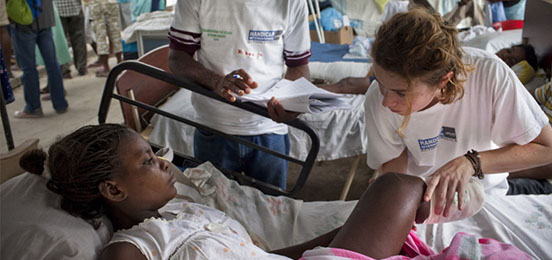Improving emergency care
The world’s first clinical guide and suite of resources developed specifically to support the early rehabilitation of patients injured in disasters and conflicts is just a year away, thanks to a project funded by the Strategy Fund. The 12-month Early Rehabilitation During Disasters and Conflicts project got underway in November 2018 and will yield a clinical guide and accompanying suite of resources, including pictures, videos, evidence-based treatment protocols, and patient information leaflets.
Initiated by Peter Skelton, Rehabilitation Project Manager with Humanity & Inclusion, the project aims to provide rehabilitation professionals with the knowledge to adapt their practices to work safely and effectively with patients in the early days of their injuries in an emergency setting. The project will offer them patient information resources that can be used in an emergency or as pre-emergency training tools to help clinicians living in disaster-prone areas, preparing to work for rehabilitation organizations in emergencies, or planning to deploy with emergency medical teams. The clinical guide and accompanying resources are also useful for clinicians working in the field.
Key collaborators in the project include AO Alliance Foundation, AO Education Institute, CBM International, Humanity & Inclusion, the International Committee of the Red Cross (ICRC), Livability, Physiopedia, and the World Health Organization (WHO).
“One very exciting part of this project is that the AO Strategy Fund grant will fund three international trips so that we can actually create instructional videos in which professionals demonstrate best practices in emergency settings,” Skelton said. “We are entirely reliant on the Strategy Fund for making this project possible. This support and the expertise of the consortium of professional organizations are absolutely critical to bringing the project together.”
Improving patient outcomes
Conflicts and disasters result in traumatic injuries, and early rehabilitation can significantly impact patient outcomes. “Historically, in conflicts and disasters the focus has been on saving lives, which is critical and understandable, but it is not sufficient,” Skelton said. “A key consideration is the quality of outcomes from a clinical perspective and quality of life from a patient perspective.”
Early rehabilitation can make a big impact on both of these issues. “Without early rehabilitation, a patient with an amputation can develop chronic pain or muscle contractures or have problems with the amputation site that can prevent them from being fitted with a prosthesis and this can affect their ability to work or care for their families,” Skelton said. “If we don’t start from the beginning, later on these patients require significant support to just move around. These sorts of injuries impact not only patients but their families.”
“Organizations in the past developed training for their own staff, but there hasn’t been a global resource, like the one we’re developing, that looks at rehabilitation in both disasters and conflicts,” Skelton explained. “This project really originates from our experiences in preparing for and responding to emergencies, where teams have to adapt their skills very rapidly, and there is no globally standardized approach to that.”
Gold-star team, solid foundation
Featuring a gold-star team of collaborators, the Early Rehabilitation During Disasters and Conflicts project—once completed—will provide a rich, evidence-based toolbox for rehabilitation professionals, clinicians, and organizations working with trauma patients in conflict and disaster zones. “It is fantastic that the AO recognizes that rehabilitation is part of, and plays a key role in, the continuum of trauma care,” Skelton said.
The project will build on the Management of Limb Injuries During Disasters and Conflicts handbook, funded by the AO Foundation and published in 2016 as the result of a collaboration between the ICRC and WHO’s Emergency Medical Teams Initiative, as well as Handicap International’s Rehabilitation in Sudden Onset Disasters manual.
Contact
Please contact the team at strategyfund@aofoundation.org


